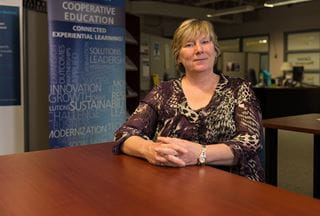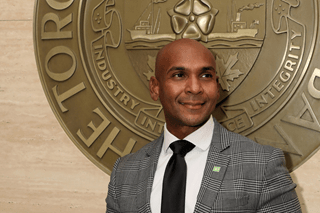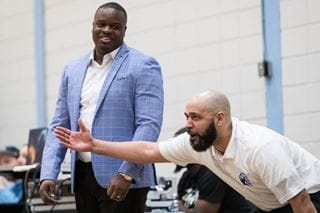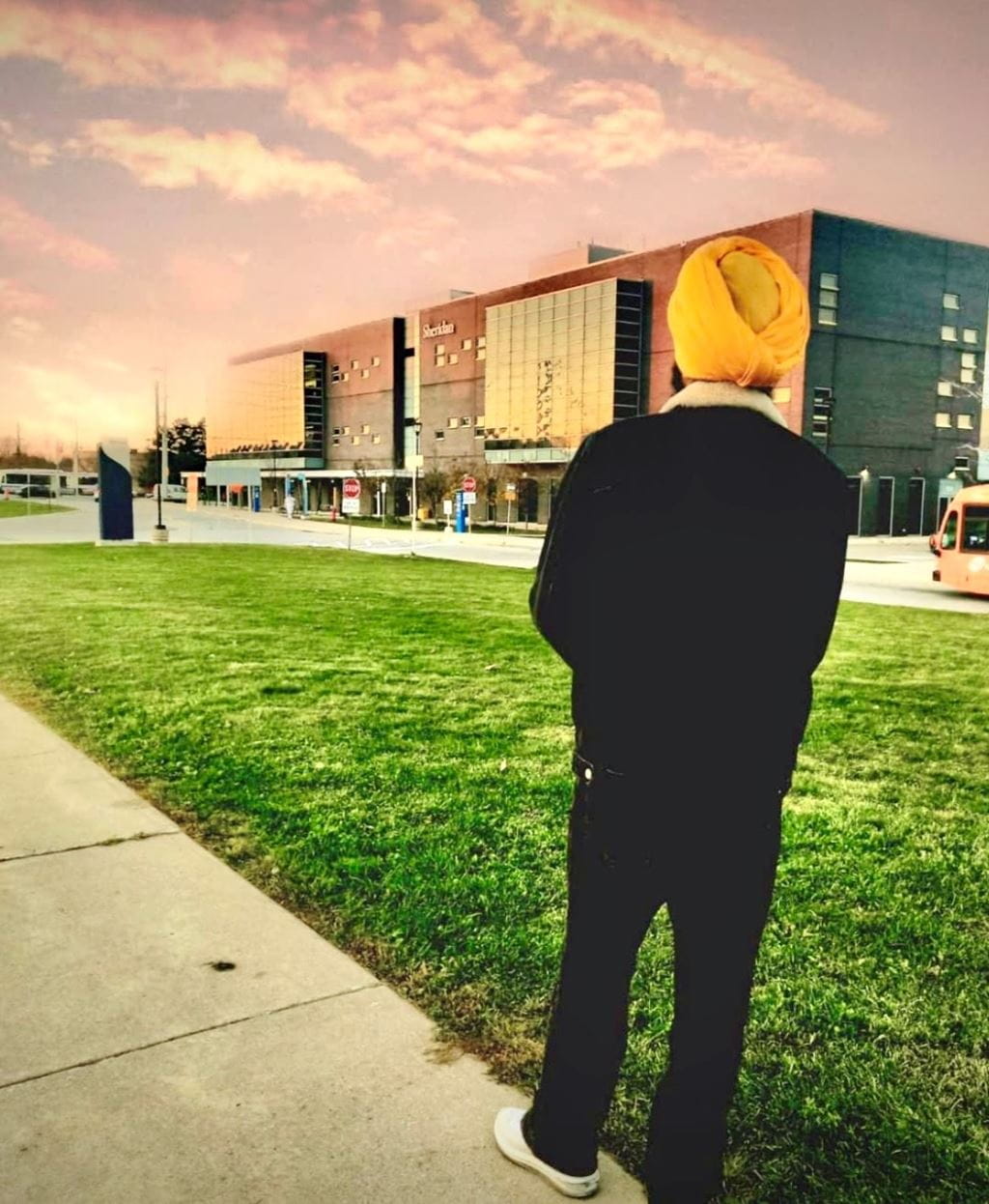
Sheridan student creates community connections with seniors and youth
 by Marianne Sy-Lucero – Jul 20, 2022
by Marianne Sy-Lucero – Jul 20, 2022 When the COVID-19 pandemic first hit India in early 2020, Sukhpal Singh (Social Service Worker ‘22) witnessed people in his community feeling powerless and stressed about what to do. He knew he had to act.
As a member of the Youth Club Society, Singh educated his community in the town of Fatehgarh Sahib about the virus and how they could protect themselves against it. He would often distribute masks, sanitizers, and other personal protective equipment (PPE) to those in need.
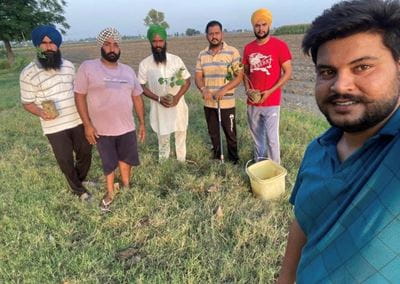 Singh’s capacity to help others was further tested when the farming protests in India took place. As the son of a farmer, Singh took it upon himself to support and spread awareness to his neighbours about the protests and what they could do to help. Singh realized how satisfying it was to help the people in his communities, drawing him to a career in social work.
Singh’s capacity to help others was further tested when the farming protests in India took place. As the son of a farmer, Singh took it upon himself to support and spread awareness to his neighbours about the protests and what they could do to help. Singh realized how satisfying it was to help the people in his communities, drawing him to a career in social work.
Pursing post-secondary education in Canada was always a goal for Singh. As an international student, it was important for him to find a college that respected diversity and created a positive learning environment for its students. Finding this at Sheridan, Singh began his studies in Sheridan's Social Service Worker diploma program in January 2021.
Studying remotely in another country has its challenges. The difference in time zones meant he had to attend classes in the evenings or late at night. Additionally, Singh faced network connectivity issues, causing him to miss portions of lectures. Despite these struggles, Singh boasts about his student experience, saying his professors were understanding and responsive. “If I had any problems, I could always reach them by email,” he says. “All of the professors did their best to teach us.”
Shortly after completing his first semester in India, Singh decided to go to Canada to continue his studies domestically.
When it came time to find a field placement, the choice was an easy one for Singh. His passion for helping others and strong connection to his Punjabi heritage led him to Helping Hands Advice Centre — a Brampton-based not-for-profit focused on supporting the cultural and language needs of the South Asian and Punjabi community.
Connecting generations
As a Technology and Heritage Class tutor, Singh provided older adults with the knowledge and resources needed for them to feel confident using a computer and engaging online.“In our culture, we have an extended family system,” explains Hardeep Kaur, Helping Hands’ Executive Director and Singh’s Placement Supervisor. “And within the family, the gap between grandparents and grandchildren is growing larger because there is no communication between them.”
The need for these tech skills became even more essential during the pandemic as people around the world turned to video conferencing tools and social media to connect with loved ones.
At the start of the pandemic, Helping Hands’ courses moved from in-person to remote delivery. This gave Singh and his colleagues the opportunity to work with a larger audience. Having to be physically in class often excluded older adults that didn’t have access to reliable transportation, as well as those suffering from health-related issues that prevented them from attending in-person. Moving the classes to a virtual platform opened the doors for those learners, allowing them to build stronger ties to the broader Punjabi community.“It's important for (our students) to be aware of their culture and traditions so that it can be passed from one generation to another. ”
Language barriers also posed a challenge for many of the participants, as most older adults enrolled in the class didn’t speak English as their first language. Singh, who can speak Punjabi fluently, took pride in being able to communicate with his students in their native language.
“Many of our technology class participants are from Punjab, India,” he explains. “So, we teach them in Punjabi language so that they can better understand the material.” Instructors also speak in English to help participants become accustomed to the language.
Enlightening youth through culture
In addition to working with older adults, Singh educated Punjabi youth, ages five years and older, about their language and culture through heritage classes.
Punjabi children who are born and raised in other parts of the world, like Canada or the U.S., aren’t always familiar with Punjab’s cultural history and language — these classes aim to change that.
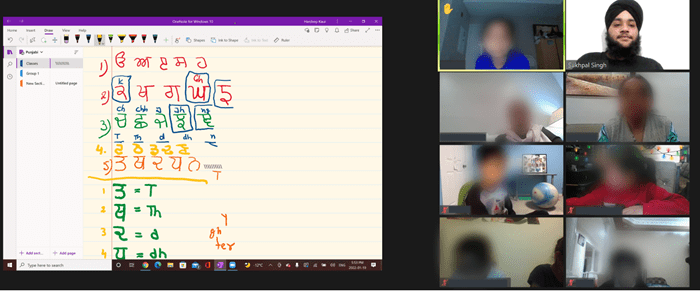
The heritage classes provided Singh with another opportunity to bring his knowledge of Punjab to his role. Having grown up in India, Singh is knowledgeable about their culture’s history and the importance of significant religious holidays. Being able to impart this information on the next generation of Punjabi children quickly became a highlight during his placement.
Singh recalls teaching his students about the Mool Mantar, an important composition in Sikhism and the opening text of the Sri Guru Granth Sahib. During this lesson, Singh taught his students the first six lines of the scripture and recalled how proud the students felt when they were able to recite it on their own.
Singh takes pride in being able to connect his students to their mother tongue and teach them about the cultural significance of festivals. “We teach our students the value of and the reason why we celebrate holidays like Diwali,” he says. “It’s important for them to be aware of their culture and traditions so that it can be passed from one generation to another.”
Looking forward
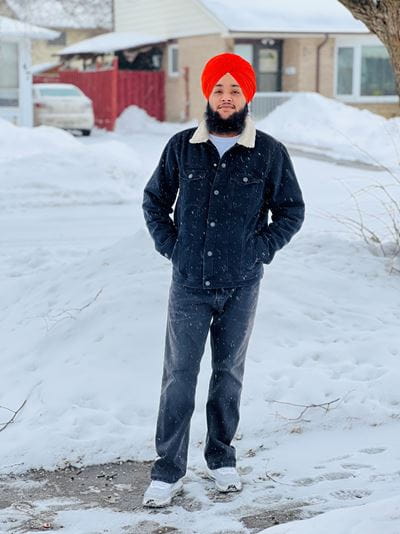 At the start of his placement, Singh recalls feeling confused and out of touch with his work, noting that he was new to Canada and still learning the ropes. This propelled Singh to work towards improving his social working skills and getting to know his role better.
At the start of his placement, Singh recalls feeling confused and out of touch with his work, noting that he was new to Canada and still learning the ropes. This propelled Singh to work towards improving his social working skills and getting to know his role better.Singh credits his professor and field placement advisor, Nicola Harris, for encouraging him to step outside of his comfort zone to discover his full potential. He is also grateful to Kaur for helping him transition into the role and for providing him with a positive space to learn and grow.
Working with older adults and youth, Singh recognized that both groups of students learned differently from one another. This allowed him to practice patience, while also building his critical thinking, communication, and time management skills. Singh believes that this is an important skills set for anyone who wants to start a career in social work.
Singh graduated from Sheridan in June and was hired on a part-time basis at Helping Hands. In the future, he hopes to pursue a bachelor’s degree in nursing so that he can continue to help those in need.
Media Contact
Meagan Kashty
Manager, Communications and Public Relations

